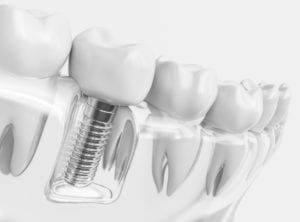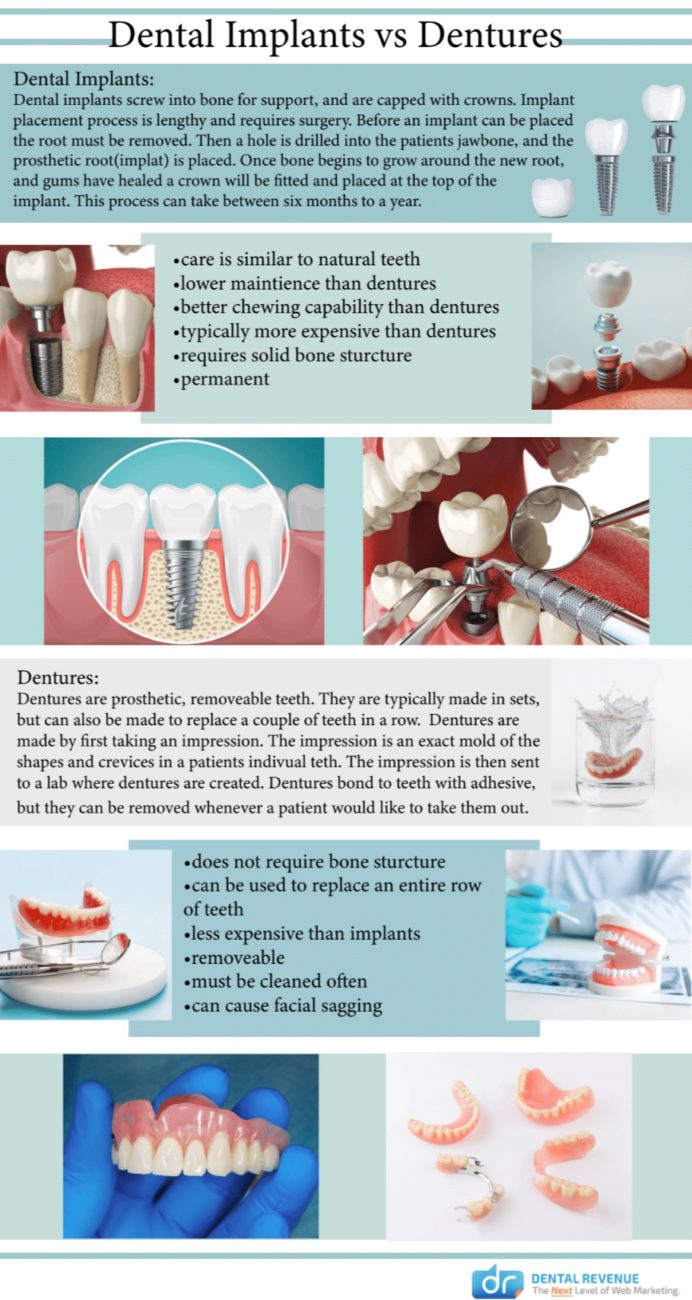When considering your restorative dentistry options, you have several to choose from. General dentists often recommend dentures and dental implants. Both options are effective tooth replacement options but in different ways.
Understanding the differences between these two restorative options will help you make a more informed decision on your smile’s long-term health and functionality. Below, we have provided additional information on the differences between implant dentistry and dentures.

Understanding Dental Implants
Dental implants in Hanover are the premier method of tooth replacement. They’re the only method of tooth replacement that replaces the tooth root in addition to the crown. They’re composed of three different parts. First, we place a titanium implant post in the jawbone. Next, a piece called an abutment connects the implant post with the final restoration. The final restoration is usually a custom dental crown, but implants can also support a fixed bridge or denture.
Implants are the gold standard because they give you back 100% of your bite function. They’re also the most stable tooth replacement solution. Because you get back that bite function, you don’t have to worry about your restoration slipping or falling out. You can speak confidently in public without eliminating any foods from your diet because your restoration can’t handle them.
Dental implants are a low-maintenance solution, too. You don’t need messy adhesive to ensure restoration stays in your mouth. You also take care of them like you would your natural teeth. Brush, floss, and visit the dentist regularly to ensure everything is going well and your mouth is healthy. There are no extra steps to taking care of dental implants.
However, not everyone is eligible for dental implants. You have to be in good oral and overall health and have a certain amount of healthy bone structure to support the implant. You may need procedures like dental bone grafts to give you enough bone structure. Implants are also a more expensive restoration option. This cost is offset, though, in the future. Your bone won’t degenerate any further, so you don’t have to get the restoration replaced or readjusted.
Understanding Dentures
Dentists usually recommend dentures for patients missing a full arch of teeth. They’re a metal and resin base that supports porcelain or plastic teeth. They use suction and adhesive to stay in your mouth and are custom-fit to your soft tissues. Partial dentures are also options if you’re missing fewer teeth than an entire arch. With the advancements in dentistry, modern dentures look more natural and feel more comfortable in your mouth than in the past.
However, traditional dentures still don’t function like your natural teeth. You only get back around 30-40% of your bite function. The dentures may shift and slide in your mouth or fall out. Eliminating certain foods from your diet is necessary because your restoration can’t break them down properly. You don’t have your full confidence in public because you worry about your restoration.
Dentures require extra maintenance, too. You have to find a good dental adhesive solution that works for you to keep the dentures in your mouth. You’ll have to clean the dentures to eliminate that sticky residue. You can’t keep the dentures in overnight because wearing them too much irritates the soft tissues. Soaking them overnight is the best way for them to stay clean.
Dentures are popular because they’re a cheaper replacement solution. They don’t have a surgical component, so their wait is also shorter. But you incur costs down the line that you don’t get with dental implants. Because they don’t stop jawbone degeneration, the fit continues to change. You have to get your dentures readjusted or replaced multiple times in the future to ensure they fit well enough for daily use.

